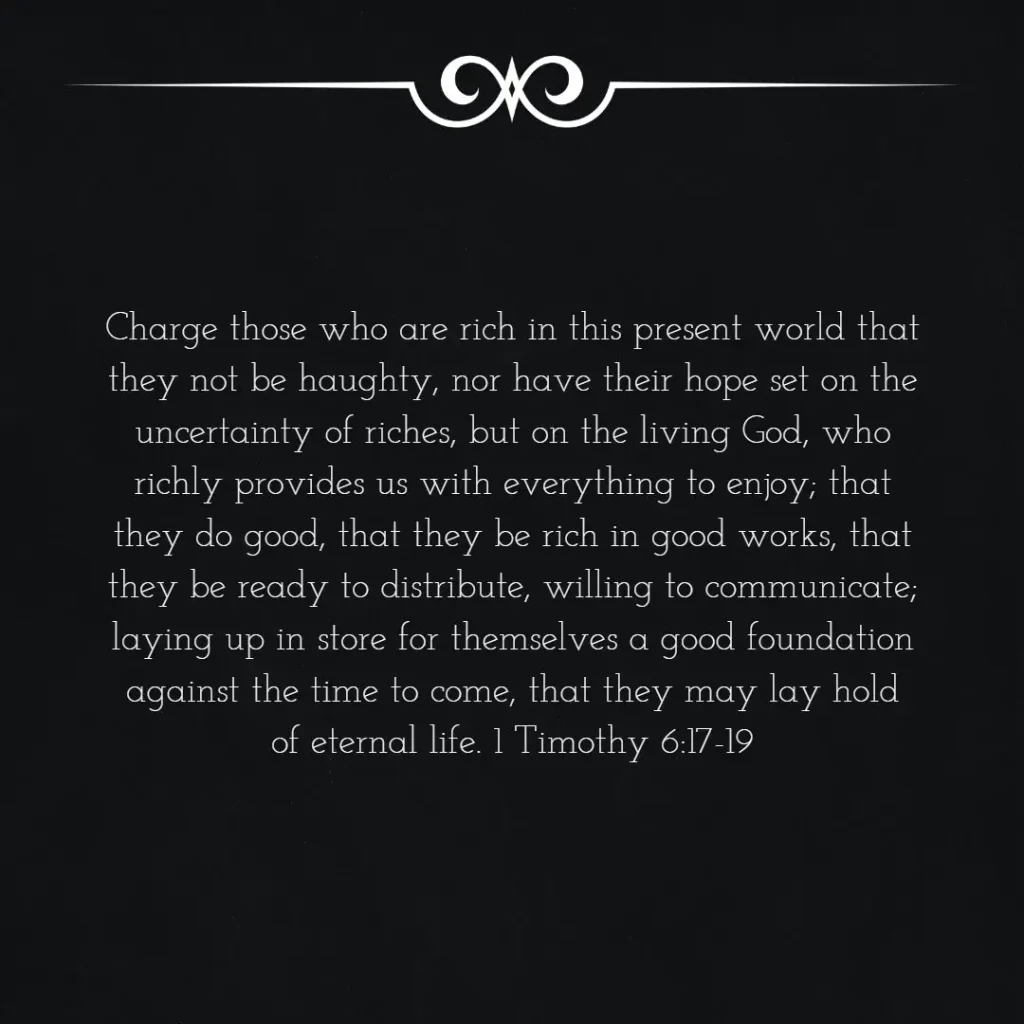Tag: generosity
Stewarding our Influence – Part 1
September 10, 2025by Ron Bare
We often hear the phrase, “you don’t need to have power to have influence,” but then struggle to see where that plays out practically. I’d invite you to consider a coworker, past or present, who has a way of quietly encouraging others. They may not have a leadership title, but they bring peace to the workplace and help build a culture of trust, don’t they? Over time, they shape the company’s culture in ways formal leaders sometimes can’t. This is the heart of Christian influence. God entrusts each of us with gifts – relationships, time, and opportunities. How we use those gifts matters, and like that coworker, I hope you are encouraged to leverage your influence, not to make your name great, but to serve God and others.
We all have countless opportunities to steward our influence for God’s kingdom. But how do we know we have been given this role? We read about it in the very first chapter of the Bible! In Genesis 1:28, God says to mankind, “Rule over the fish in the sea and the birds in the sky and over every living creature that moves on the ground.” Then in Genesis 2:15, “The Lord God took the man and put him in the Garden of Eden to work it and take care of it.” In giving mankind authority to “rule” and “take care of” the earth, God demonstrated significant trust. With this trust comes great responsibility. Wherever we engage with this world, at home, the office, our church, or our community, let these passages be a reminder that faithful daily work in these arenas is part of honoring God’s entrusted authority and influence.
Why does this matter? Luke 16:10 reads, “Whoever can be trusted with very little can also be trusted with much…” When we honor God by faithfully engaging our small responsibilities, our influence naturally expands. A small moment of choosing integrity at work, an act of generosity, or a moment of thinking before speaking – all of it shows that we take our responsibilities from God seriously. That small moment of integrity could even evolve into a greater opportunity for influence. Maybe a boss takes note of your integrity. Time after time, integrity proves to be innate in you, and when submitting a name for a promotion, your boss thinks of you. Now, trusted with a supervisory role over other employees, you have even more influence that can be used for good. Be someone who is trustworthy with little.
Genesis speaks to the fact that we certainly have influence, because of the gifts God has trusted us with. But there’s a parable in Matthew 25 that speaks to the idea of what exactly we should be doing with this influence. The master in this parable entrusts resources, or talents, to three servants. The master leaves for a time and upon his return, finds that two servants invested the talents and multiplied what was given to them, while the third buried the talent, preserving its worth. The master is pleased with the first two servants but condemns the third, going so far as to call him “wicked.” Our influence is just like those talents. Given to us by our master, God, we are reminded that He expects growth, not simply preservation. How are you growing your influence? Today we looked at influence from a 30,000 foot view. Next month, we’re going to come down into the weeds. We hope you’ll consider joining us in October, as we talk about practical ways to steward our influence.
5 Key Principles to Help Maximize Impact
December 5, 2024By Ron Bare

Many of you share our passion for maximizing our impact on this earth by using the gifts and resources that God has entrusted to us. Why do we choose to do this? For His glory, so that we can play a part in accomplishing His purpose and plans!
Whether you’re ready or not, 2025 is fast approaching, and we believe there are five key principles that can help you maximize your influence and impact in the new year!
First, remind yourself regularly that God owns all of your resources. God has been gracious to each of us by providing what we have. Just as car manufacturers define how their cars function–designing each part and assembling the car–the Creator of all things defines the purpose and use of the resources that He gives. He has entrusted resources to us, empowering us to honor Him in how we manage them. Understanding that God is the owner of our resources changes everything about how we handle our personal and business finances.
Second, learn the secret of contentment! Paul talks about learning this secret in Philippians 4. This passage reminds us that contentment doesn’t come naturally to us, because you don’t have to learn something that’s innate! We have found a few practices that have helped us learn this secret. We encourage you to take a close look at your finances and define how much is enough. How much do you need to live on annually? Don’t be afraid to throw some fun things in that budget – God does have an interest in our enjoyment, and sometimes that requires money. When you’ve defined enough, draw a finish line. Determine the amount you will accumulate, and walk in confidence, knowing that it will suffice. If you happen to accumulate more, consider giving the excess away!
Third, give extravagantly! I could talk about this principle forever. It can be a difficult one to implement but is incredibly valuable. 2 Corinthians 9 offers helpful insights on generosity and we encourage you to spend time reading through it. We truly believe our God is a God of abundance and provides us with what we need to be generous. If God is the true owner of our resources, let us show gratitude for all He has given and give back to Him! All that He asks of us is to determine how much to give, and then to give with a joyful heart.
Fourth, create a vision for how to allocate your resources. We read in Proverbs 29:18 that without vision, people perish. Take some time to look around your community, your church, your neighborhood, and your family, and ask why God may have given you the influence and wealth that He has. How does He intend for you to use your resources? What has He laid on your heart? Pay attention to those passions, and chase after them.
Finally, align your finances to this vision. Once you have an idea of how God might have you use your resources, begin to make a plan for it. Consider how you can collaborate with other organizations or families. How can you be generous with your time and money? Can your church, neighbors, or family benefit from what you have been given? Continue to pray and be open to guidance the Lord might provide for you.
What is your vision? Why has the Lord blessed you with the resources you have, whether it is an abundance of wealth or your time, talents or influence? Who in your community needs care? If you’re not sure, take some time to pray. The Lord hears our prayers; rest assured in that. We look forward to walking alongside you as you seek to serve those around you and impact the world for good in 2025!
Do You Believe You Can Change the World?
May 1, 2024by Ron Bare
What would it take for you to believe that you could change the world? What if I proposed that it simply starts with intentionality and a generous heart? Would you believe me?

At Bare, we truly believe this. It takes commitment and planning, but when you’re ready, we’ll be right here to support you. Through intentional stewardship and extravagant giving, we help generous people shift the
culture and change the world for the glory of God.
Changing the world starts with changing your world. Last month, we talked about what it means to be faithful stewards of what God has given us. We must first define generosity, define enough, and then set financial goals.
Many of these financial goals are long-term goals – even lifetime goals. There are 6 main long term goals, or “buckets,” that we find most of our clients to
be pursuing.
The first bucket is financial independence or retirement. This bucket is focused on how much will be enough to meet their needs and accommodate their lifestyle after working full-time. The second bucket is debt elimination. This bucket is working toward paying off all debts and committing to a debt-free future. The third bucket is additional lifestyle goals. This bucket is planning a large one-time purchase, like a cabin or a beach house.
The fourth bucket is family goals. This bucket is considering how they’d like to support their children or grandchildren. The fifth bucket is centered around giving goals. This bucket begins to move beyond the 10% tithe principle into greater giving. The sixth bucket is new opportunities. This bucket is seeking new business or investment opportunities.
In our experience, our clients are typically pursuing goals in a few of these buckets.. We have walked with people from all walks of life and have been able to support them no matter the goal they are pursuing.
When a client defines ‘enough’ and accumulates ‘enough,’ the buckets of retirement and lifestyle goals become filled (see last month’s blog.) On top of that, when all debt is paid off, they find themselves looking at three full buckets! With these three full, the client gains freedom to explore the final three buckets with a different perspective. I like to call these final three buckets the impact buckets.
The first of the impact buckets is the giving bucket. The key theme of this bucket is the impact that intentional planning and giving can have on the world. When we move beyond simply what we need, we are able to consider eternal impact and our legacy.
Typically, the giving bucket begins with giving 10% of our income. When we are in a position to consider giving more than 10%, we begin to wonder what else we can support. We are no longer simply giving out of our income, but also giving out of our assets and accumulation. We begin to see problems around us and are able to give significantly toward their solutions, rather than simply supporting a good cause.
This requires intentional planning about allocating funds, whether to an organization you are passionate about or otherwise. We highly recommend setting up a donor advised fund, which is a tool to help you plan and manage your giving. This fund helps you maximize tax benefits and make a plan for your giving. I love what 1 Timothy 6:17-19 has to say about this. It paints a beautiful picture of extravagant giving and good works flowing together!
Do you believe you can change the world? If you take intentional time to plan and consider extravagant giving, I think you’ll be surprised at what happens. Next month, we’ll cover the family bucket, and how this bucket can be used to shift our culture and influence our world for good!
Living Faithfully – A Practical Guide
February 23, 2024by Ron Bare

Without a doubt, my favorite moment when flying on a plane is the descent. We’re finally about to land at our destination, whether it is a beautiful beach, a tropical island, or majestic mountains. And every time, I am in awe at the landscape below me. The way that the mountains, forests, oceans, and cities weave together captures all my attention. It’s stunning.
But I soon start to wonder. How do you get down there? Where does that path lead? Are there waterfalls in that forest that I can’t see from up here? What kind of wildlife lives in those mountains? These questions can only be answered on the path, in the forest, in the mountains, on the ground.
Today I want to take you with me to the ground. Last month, we were on the plane, looking at the idea of faithfulness from 10,000 feet in the air – what it means and what things hinder it. But simply talking about faithfulness can leave us lingering with questions about what it truly looks like on the ground, in real life.
As we consider faithfulness practically, we have six big thoughts and then a few practical tips that we believe are beneficial.
First, remember that God owns everything, and we are simply stewards. When we understand that everything we have belongs to the Lord, our heart is naturally drawn toward gratitude and faithfulness.
Second, work is important! God has given each of us resources to manage and they cannot be managed without discipline. Resources will not grow overnight; we must work to increase and invest in them.
Third, find contentment in the time, talent, and treasure God has given to you. Contentment is hard, that’s just the reality of it. Yet when we become content with our resources, how much easier it is to be faithful! We’re not constantly longing for more, promising that when we get just a little bit more, then we will choose to be faithful.
Similarly, be generous with this time, talent, and treasure! Generosity is the overflow of a content heart. When we understand that nothing we have is truly ours and are not longing for more, we will be generous.
Next, grow what God has given to you! In the parable of the talents, we see the master (Jesus) pleased with those servants who have increased what he originally gave them. While the master is gone, the servants are working hard to invest and even double what the master has given them to manage.
Finally, transfer stewardship to the next steward coming after you! Think of the generations to come after you – what can you teach them about stewardship? What have you learned in your lifetime both from successes and mistakes that can be passed on? Are you investing your wisdom into your kids, grandkids, neighbors, friends at church, or employees?
As we consider what faithfulness looks like, we’ve found two key practices that help get our minds and hearts in the right place.
Studying God’s Word and specifically the passages related to money is a great place to start. There are so many passages, and we’ll list a few of them at the bottom of this post!
Additionally, we’d encourage you to begin each day with this prayer – “God, all I have is yours. What would you have me do with the time, talents and treasure that you have placed in my hands?” As you pray this prayer, consider your impressions. Write them down, share them with your spouse or trusted friends, and engage with what God might have you do.
What have you discovered in your time on the ground? What is God asking you to do with what He has entrusted to you?
Fun fact – there are over 2,300 passages relating to money in the Bible! Here are just a few passages to consider when studying what God’s word says about faithfulness, stewardship, and money.
- I Timothy 6:17-19
- Psalm 24:1
- Jesus’ parables (about one third of them have to do with money)
- Matthew 13:44-46
- Matthew 25:14-30
- Luke 12:13-21
- Luke 18:10-14
- Luke 16:1-13
- 2 Corinthians chapters 8 and 9
- Malachi chapter 3
Impact – Why we do what we do!
February 6, 2023
by Ron Bare
“Through intentional stewardship and extravagant giving, Bare Wealth Advisors help generous people shift the culture and change the world for the glory of God.”
As we have been writing about in our latest series of blogs and articles, our vision is to not only help you plan strategically with your finances, but our main desire is to help you maximize your impact (with the financial capital you are stewarding) for the next generation and for the good you desire to have on this earth. The quote that begins this blog is what we are calling our “impact statement.” We have seen and believe that intentional money management and generosity are a key element to making the impact we desire.
Throughout history there have been individuals that God has used to shift culture for the glory of God. Billy Graham, William Wilberforce, Dietrich Bonhoeffer, Corrie ten Boom, Rosa Parks, and Martin Luther King all come to mind as individuals that used their time, talent and treasure to make a difference in our world. To a great extent, we are benefactors of their efforts. You can read more about some of these individuals in Eric Metaxas Books; Seven Men and Seven Women.
Often as you look behind the names mentioned above you can find others who have supported these movements with their gifts – including financial gifts. I think of William Tyndale, responsible for translating the Bible into English (putting his life on the line!) and how this may never have happened without Humphrey Monmouth who financially backed the endeavor. I also think of John Newton, responsible for writing many hymns including “Amazing Grace”, who also mentored William Wilberforce to use his gifting’s in politics rather than go into “ministry.” Wilberforce went on to help lead the abolishment of the English slave trade. Without John Thornton’s financial support from his successful business enterprises we may not know of the name John Newton or William Wilberforce – that jolts me! You can read more about these stories in John Rinehart’s book, “Gospel Patrons.”
These stories inspire us to think about our impact. We may not be Billy Graham, William Wilberforce or Mother Theresa – however what if we are those who are to support and financially fund the movements in 2023 that will shape the next 50 – 100 years of history? There has never been a more prosperous time in history, and with that in mind, we must ask ourselves – what does God want me to do with his resources (that He has entrusted to us) to make an impact in our culture today?
We have a great opportunity. Lets expand our vision of what God may want to do through our stewardship and generosity so we can shift the culture and change the world for the glory of God. William Wilberforce had a dream to end the slave trade – as a result of him fulfilling this calling, generations have been changed, culture has shifted and God has been glorified. We can do the same! Our desire at Bare Wealth Advisors is to help you leave this kind of impact!
- 1
- 1-5 of 5 results